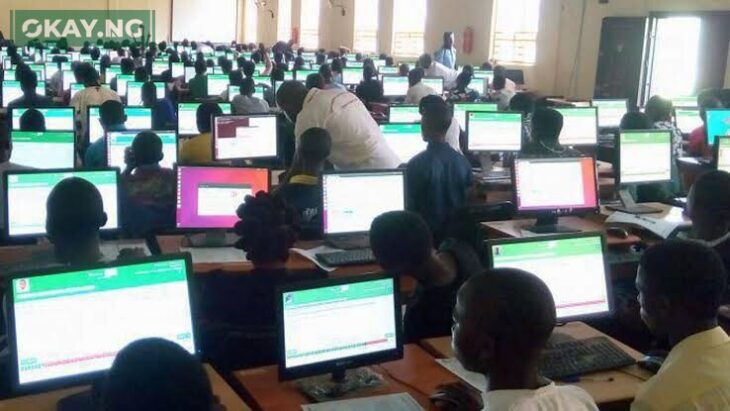The 2025 Unified Tertiary Matriculation Examination (UTME) results have sent shockwaves across Nigeria, with an alarming 77% of candidates scoring below 200 and less than 1% crossing the 300 mark. This massive dip in performance has not only raised concerns among education stakeholders but also ignited debates about the root causes. As the nation grapples with the implications of this outcome, it becomes crucial to examine the role of students, parents, environment, peer influence, government policies, and especially the pervasive grip of social media platforms like TikTok, Facebook, and many others.
Estimated 2025 JAMB UTME Performance Breakdown (by Score Range)
Score Range Estimated % of Candidates Remarks
300 – 400 0.5% Exceptionally few candidates reached this top tier.
250 – 299 5% Very limited high scorers.
200 – 249 17.5% Some candidates did fairly well.
150 – 199 35% Most candidates fell in this average band.
100 – 149 32% Significant number of low performers.
Below 100 10% Critically poor performance.
Key Insights:
77% of candidates scored below 200
Less than 1% scored above 300, showing a sharp decline in excellence.
The majority clustered between 100–199, confirming a weak general performance across board.
UNDERSTANDING THE CAUSES OF THE MASS FAILURE
Student Attitude and Poor Academic Discipline
At the center of the crisis is the alarming trend of poor study habits among students. Many candidates are no longer committed to rigorous academic preparation. Instead, they spend valuable time on entertainment and digital distractions, sidelining their books in favor of mobile screens.
Social Media Distraction
Social media, particularly TikTok, plays a major role in the declining academic focus of Nigerian youths. The platform’s addictive short-form video content consumes hours that could be spent on revision and academic engagement. The quest for online fame and virality has taken precedence over real-world academic success.
Short attention spans, content addiction, and misplaced priorities have turned many students away from intellectual pursuits. Instead of consuming educational content, many opt for dance videos, skits, and viral trends that offer little to no academic value.
Parental Roles and Negligence
Parental guidance is a crucial component of a student’s academic success. Unfortunately, many parents have become too distracted, overworked, or uninformed to actively monitor their children’s academic progress. Some provide smartphones and internet access without setting boundaries, indirectly enabling the digital distractions that hamper learning.
Additionally, economic challenges in many households mean that children lack access to textbooks, private lessons, or conducive learning environments at home.
Environmental and Peer Pressure
The environment in which a student learns has a significant impact on their academic performance. In areas with insecurity, poverty, or poor infrastructure, learning becomes secondary to survival. Add to this the influence of peers who downplay academic seriousness in favor of social trends, and the decline becomes more understandable.
Peer pressure often pushes students into unproductive circles where reading is mocked, and academic ambition is seen as “uncool.”
Government Failures and Systemic Challenges
Frequent policy shifts, under-funding of the education sector, and infrastructural decay are key contributors to the failure rates. Many schools operate without adequate teachers, laboratories, or even basic furniture. Technical glitches at Computer-Based Testing (CBT) centers during exams further frustrate and discourage students.
The government’s inconsistent commitment to educational reform reflects in the poor results. While new policies are announced regularly, their implementation remains weak or entirely absent in many areas.
Educators and Institutional Decay
Some schools, especially in rural and low-income areas, are manned by unqualified teachers. Teachers themselves are often underpaid and poorly motivated, affecting the quality of instruction. When educators are not inspired or equipped, their students inevitably suffer.
The Way Forward
To reverse this dangerous trend, a multi-pronged approach is needed:
Students must be encouraged to develop discipline and time-management skills, limiting their social media use and focusing on academics.
Parents must take an active role in supervising and supporting their children’s education, both morally and materially.
Educators must adopt innovative and engaging teaching methods, especially those that incorporate responsible digital tools.
The Government must prioritize education through increased funding, better infrastructure, and support for qualified teachers.
Society at large must reorient its values—celebrating academic achievement as much as online popularity.
The 2025 UTME/JAMB result is a wake-up call. It signals not just a failure of students but a collective failure of systems, values, and priorities. Unless urgent action is taken to redirect the energies of Nigerian youths from TikTok, Facebook and every other social media trends to textbooks—the future of education in the country remains at risk. The time to act is now
Follow us now for more news in Oyo State. Oyo Truth is an independent online news /medium reporting up-to-date events, happenings and activities related to Oyo State, Nigeria.







Leave a Reply